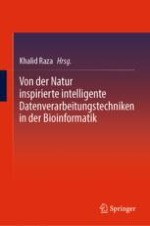2024 | OriginalPaper | Buchkapitel
Potenzielle Rolle der naturinspirierten Algorithmen zur Klassifizierung von hochdimensionalen und komplexen Genexpressionsdaten
verfasst von : Sahar Qazi, Ayesha Khanam, Khalid Raza
Erschienen in: Von der Natur inspirierte intelligente Datenverarbeitungstechniken in der Bioinformatik
Verlag: Springer Nature Singapore
Aktivieren Sie unsere intelligente Suche, um passende Fachinhalte oder Patente zu finden.
Wählen Sie Textabschnitte aus um mit Künstlicher Intelligenz passenden Patente zu finden. powered by
Markieren Sie Textabschnitte, um KI-gestützt weitere passende Inhalte zu finden. powered by
